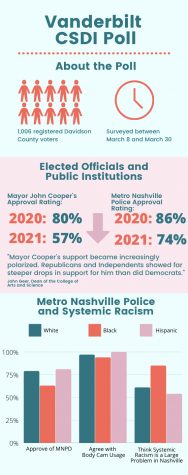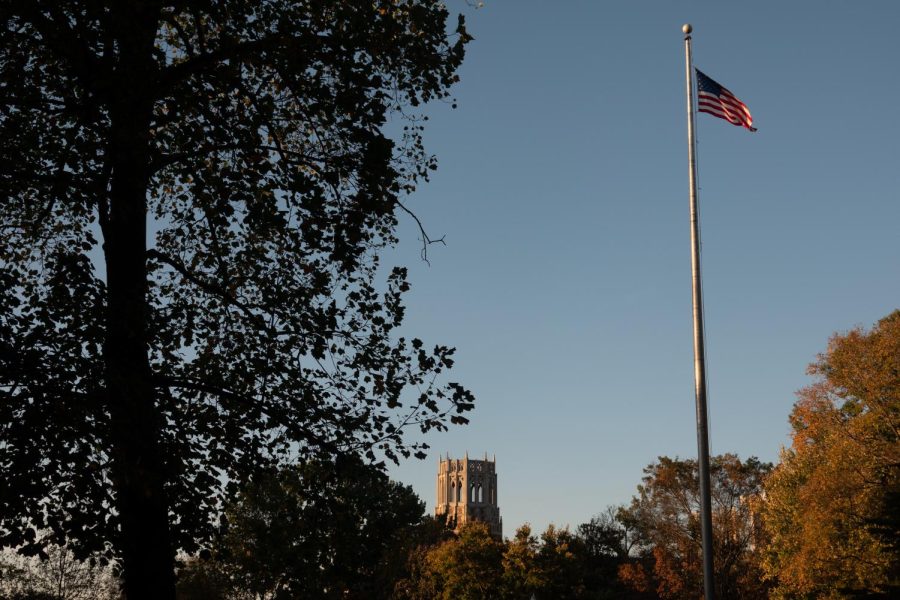Vanderbilt University’s Center for the Study of Democratic Institutions (CSDI) surveyed 1,006 registered Davidson County voters between March 8 and March 30 as part of their annual poll. The Vanderbilt Poll results found decreased approval ratings for elected officials, Metro Nashville Police Department (MNPD) and public schools, with a majority agreeing that systemic racism was a major local issue.
This year’s poll, directed by Dean of the College of Arts and Science John Geer and political science professor Josh Clinton, had a margin of error of ±4.6 percentage points. The CSDI’s annual countywide poll, which began in 2011, utilizes Vanderbilt’s private, independent funding to conduct surveys and release its findings.
“Overall approval for elected officials and institutions has slipped, but Nashville residents continue to give high marks to Mayor John Cooper on most issues, which speaks to his successes in responding to the many challenges our community faced the past year, including tornadoes, the pandemic and the December bombing,” Geer said in the press release.
A majority of Nashvillians—59 percent—still believe Nashville is “generally headed in the right direction,” although this percentage is down from 63 percent last year. Forty percent of poll respondents reported that they felt things in the Nashville area are “on the wrong track,” up four percent from last year.
Slipping confidence in elected officials and public institutions
There has been an overall decrease in the approval ratings for elected officials since 2020. Mayor John Cooper’s approval rating has fallen to 57 percent from 80 percent last year.
“Mayor Cooper’s support became increasingly polarized,” Geer said in a Vanderbilt press release. “Republicans and Independents showed far steeper drops in support for him than did Democrats.”
Approval ratings for Metro City Council (63 percent), Metro School Board (60 percent), Congressman Jim Cooper (65 percent), MNPD (74 percent) and director of Metro Nashville Public Schools (MNPS) Adrienne Battle (72 percent) have declined since the previous year.
Metro Nashville Police and systemic racism
In 2020, 86 percent of respondents approved of MNPD. In 2021, this number fell 12 percentage points to 74 percent. The 74 percent of individuals polled who approved of MNPD included 81 percent of Hispanic people polled, 79 percent of white people polled and 63 percent of Black people polled. Additionally, 80 percent of respondents agreed that a public commission should oversee the MNPD. Ninety-six percent of all individuals polled agreed with the usage of body cameras by police officers, including 100 percent of Hispanic respondents, 97 percent of white respondents and 94 percent of Black respondents.
“Most seem relatively content with how the police department handles public safety issues in
Nashville,” Clinton said in the press release. “There are important and significant differences by race that require further discussion and study. But there is also broad agreement across race and partisanship on several issues—such as the use of body cameras—which is a good place to start those conversations.”
Sixty-eight percent of total respondents agreed that systemic racism and race relations in the Nashville area posed either “an extremely large problem” or “a large problem,” including 54 percent of Hispanic people, 61 percent of White people and 85 percent of Black people surveyed.

Republicans less likely to be vaccinated than Democrats
Although Governor Bill Lee announced that the COVID-19 vaccine would be made available to everyone above the age of 16 on March 22, the poll revealed that many respondents feel hesitant about receiving the vaccine. Forty percent of Republican respondents reported feeling either unsure they will get the vaccine or said that they do not plan to get it at all. This compared to just nine percent of Democrats polled who reported feeling hesitant about getting the vaccine.
“Given the differences in vaccine hesitancy across racial and partisan lines, it seems like additional outreach is needed to reach those residents that are unsure about the vaccines,” Clinton said.
This year, concern levels for contracting COVID-19 lowered slightly overall. The percentage of respondents who reported feeling “very concerned” for contracting COVID-19 (49 percent) saw a decrease of 3 percent from 2020, those “somewhat concerned” (25 percent) saw a decrease of 5 percent, those “not too concerned” (10 percent) saw a decrease of 2 percent and those “not concerned at all” saw an increase of 2 percent. Twelve percent of all respondents from 2020 reported that they or someone they knew had already gotten sick from COVID-19, an increase of nine percent from the previous year. Although Nashville lifted its mask mandate for outdoor settings on April 8, after the poll was conducted, 93 percent of Republican respondents and 96 percent of Democrat respondents reported “usually” or “always” wearing a mask.
“People’s willingness to get the vaccine is very much tied to political party, which we have seen across the country. Nashville is no exception to this phenomenon,” Geer said. “Partisanship is infiltrating almost every aspect of our lives.”
Increasing public education concerns
In 2021, 25 percent of respondents felt that MNPS schools were performing “below average/failing,” up 14 percent from the previous year. Thirty-four percent of respondents felt that the performance of MNPS schools was “excellent/good” and 40 percent of respondents felt the schools’ performance to be “average,” a decrease of 17 percent and an increase of 3 percent from 2020, respectively.
“This decline in perceived performance of public schools may be temporary,” Geer said. “Assuming we go back to full in-person teaching by the fall, the public’s judgment about schools may improve to pre-pandemic levels.”
Eighty-two percent of all Davidson County voters agreed that public schools should not be limited to online instruction. Fifty-four percent of the total poll respondents, including 66 of polled Democrats and 54 percent of polled Independents, support the current hybrid learning format for MNPS until more residents are vaccinated. Twenty-eight percent of respondents, including 58 percent of polled Republicans, supported a full-time, in-person learning format five days a week under proper safety precautions, even if not enough residents have been vaccinated.












